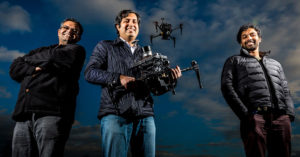
For the last decade, the battle for supremacy in the video game arena has been waged by three players — Microsoft, Sony and Nintendo. These are companies with long track records, numerous successes, some setbacks and failures — but most importantly, deep pockets and experience in the marketplace.
However, an upstart called “Ouya” is looking to challenge the big three and is looking to raise money in a Kickstarter.com-based campaign. Led by video game veteran Julie Uhrman, who was formerly the VP/GM of digital distribution at IGN Entertainment, the company has attracted a who’s who of angel investors including Digg founder Jay Andelson; Eric Hautemont, publisher of the Ticket to Ride board game; Joe Greenstein, founder of Flixster; and Hosain Rahman, founder of Jabone.
The game system, which reportedly already has a US$99 price point, will feature an open source operating system based on Android. Any developer will reportedly be able to build on the platform, but all games will be required to be free-to-play, at least initially.
“I’m not surprised to see the Ouya come out,” said Billy Pidgeon, principal analyst at M2 Research. “I actually expect several devices like this.”
Open Door for Open Source
Timing could be everything, especially as the current crop of consoles are showing their age. While Nintendo has its next generation system, the Wii U, on deck for a fall release, Sony and Microsoft have yet to even announce their next systems.
But will consumers embrace a new system from an unknown, especially one based on open source? Up to now, the most famous effort was Indrema. More than a decade after being announced, it was little more than vaporware.
Indrema was also based on Linux, “but for a game developer Linux was very complicated,” Pidgeon told LinuxInsider.
Although Ouya’s business model of open source and free software sounds very much like a replay of Indrema, the difference could be in the timing.
“It is a good time, and I’m glad to see it start,” added Pidgeon. “There are still a lot of unknowns, but this could be a system that is less for the hardcore and more for the casual gamer.”
Free to Play
The reported cost of the system and the fact that games could be free to play could make this very compelling for gamers, but it could make it challenging for the company to actually make a profit, especially if the consoles cost more to make than the selling price.
“If they are running a business at a deficit, that isn’t wise,” said N’Gai Croal, chief consultant for Hit Detection. “But if they could break even or be slightly profitable selling the console, they could be onto something.”
Developers will be able to monetize the games through virtual goods, subscriptions or purchasing after a limited-time demo. Ouya will take 30 percent of all the transactions, which puts the company on par with Apple. And given that Android is at the core, it isn’t hard to see Google push for this to succeed.
“This is one area where third parties can easily build on top of Android and do so freely,” said Pidgeon. “It also gives Google a chance to penetrate the living room far deeper than Apple. The Apple TV system is still tied to an expensive piece of hardware, where this is this $99, which is a great price.”
Community Fund Raising
Ouya could also get a boost from game developers looking to have a system to break into the market. The company is raising money through the micro-funding efforts with Kickstarter, which in turn could create a loyal community.
“They are trying to raise $950,000,” said Croal. “It is a lot of money if you can’t raise it, but for Ouya it is within reach. The thing that is cool about going to Kickstarter is that those who give money become promoters for the system. They are likely to buy it and evangelize it.”
However, the open source solution could also open the door for others to try a similar play.
“The platform isn’t really the hardware — it is the software,” said Pidgeon. “That’s what is going to be tricky for the Ouya folks. There is a really low barrier for competitors to compete against Ouya.”















































